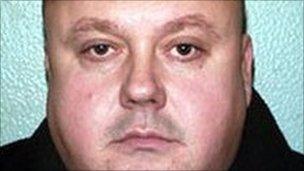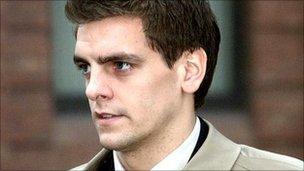How prejudicial reporting has led to collapsed trials
- Published

Levi Bellfield: The jury was discharged before reaching a verdict on the final charge
The jury in the trial of Levi Bellfield has been discharged by the judge because of prejudicial publicity.
Bellfield was convicted on Thursday of murdering Milly Dowler - but the jury were still considering a separate charge that Bellfield had attempted to abduct an 11-year-old girl.
Defence counsel argued that the jury could no longer reach a fair verdict on this outstanding charge because of some of the coverage of the case following Bellfield's conviction.
Judges ask juries to follow a simple rule - that they must deliver a verdict on a defendant based on the evidence heard in court alone. At the same time, the media have a legal duty to report only what is heard in court, to avoid prejudicing the jury.
It is rare for a trial to collapse because of prejudicial reporting - but it can lead to media organisations facing Contempt of Court proceedings for failing to follow the rules. Here are some of the most recent examples of where a trial has collapsed or been halted:
2001: Footballers on trial
In 2001, the then Leeds United footballers Jonathan Woodgate and Lee Bowyer were accused of assaulting a student.

The trial of Jonathan Woodgate was halted because of a Sunday Mirror article
But the trial collapsed after the Sunday Mirror published an interview with the victim's father while the jury was considering its verdict.
Mr Justice Poole stopped the trial in Hull and ordered a second trial for the Leeds players and their co-defendants because he feared the Sunday Mirror story could prejudice the jury.
The newspaper was heavily criticised by two judges and ordered to pay £175,000.
Lord Justice Kennedy, sitting with Mrs Justice Rafferty in London, said the timing and content of the article had been "such as to imperil a lengthy, expensive, high-profile and difficult trial at a difficult time".
At the retrial, Woodgate was found guilty of affray, but not guilty of grievous bodily harm. Bowyer was cleared of all charges.
1991: The prejudicial headline
In 1991, two sisters, Lisa and Michelle Taylor, were convicted of stabbing to death Alison Shaughnessy in 1991 - but they were cleared on appeal in 1993 because of prejudicial reporting during their trial.
The Sun had published an article featuring a photograph of Michelle Taylor in the background at Ms Shaughnessy's wedding with the headline: The "Killer" Mistress Who Was At Lover's Wedding. There was an arrow from the word "killer" pointing at Michelle's face.
A photograph showing Michelle Taylor kissing her former lover, John Shaughnessy, at his wedding had also been doctored.
A judge ruled that the coverage had been "sensational, inaccurate and misleading".
1997: Fine for London Evening Standard
London's evening newspaper was fined £40,000 for Contempt of Court after it published an article that halted the trial of men who had been accused of escaping from Whitemoor Prison in Cambridgeshire.
The article, which was published while the trial was in progress, revealed that some of the six men were members of the IRA.
1995: EastEnders-linked trial aborted
In 1995, Geoff Knights, the partner of the former EastEnders actress Gillian Taylforth, was accused of assault. The trial was scrapped before it had begun because of what the judge described as "scandalous" reporting.
- Published24 June 2011
- Published24 June 2011
- Published23 June 2011
- Published23 June 2011
- Published23 June 2011
- Published23 June 2011